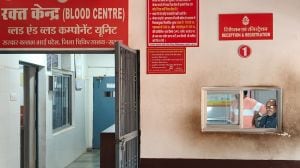Explained: What does it mean to be immunocompromised during Covid-19?
Coronavirus (Covid-19): A person from any age group can become immunocompromised either due to certain medical treatments or due to diseases such as auto-immune diseases.
 A patient diagnosed with coronavirus disease (COVID-19) lies in a ward at the Dos de Mayo national hospital, in Lima, Peru. (Reuters Photo)
A patient diagnosed with coronavirus disease (COVID-19) lies in a ward at the Dos de Mayo national hospital, in Lima, Peru. (Reuters Photo)
Coronavirus (Covid-19): On Wednesday, the US Centers for Disease Control and Prevention (CDC) issued guidelines for people who are at increased risk of getting severely ill from Covid-19. These include those who are 65 years or older, people with chronic lung disease or moderate to severe asthma, those with heart disease and immunocompromised people.
A person from any age group can become immunocompromised either due to certain medical treatments or due to diseases such as auto-immune diseases. Conversely, reports have indicated that in some Covid-19 patients, even seemingly healthy ones, death has occurred probably due to a cytokine storm, which is when the immune system goes into overdrive, thereby damaging even healthy tissue, leading to multiple organ failure, sepsis and potentially, even death.
Essentially this means that the immune system needs to be working in a controlled manner to be efficient in fighting off infection.
From Explained: Who was June Almeida, the virologist who first saw the coronavirus?
What does it mean to be immunocompromised?
Research indicates that age, people with certain comorbidities and those with weakened immune systems may be at higher risk of developing severe illness and therefore, should be more cautious.
A person’s immune system helps the body to fight off infections. Therefore, it is important that the immune system is working efficiently to fight infection such as that given by the SARS-CoV-2. Ideally, once the immune system is triggered into action, it will deploy white blood cells to the site of infection, thereby aiding the recovery of the infected individual.
📣 Express Explained is now on Telegram. Click here to join our channel (@ieexplained) and stay updated with the latest
But in some people, the immune system is weakened, which means that their immune systems cannot function efficiently and therefore, make it difficult to recover or in some cases, may lead to more severe outcomes. Such people are said to be immunocompromised and there can be various reasons for this, such as cancer treatment, existing comorbidities, age and genetics among others.
Further, some medications called immuno-suppressants can also lead to a weakened immune system. These medications dial down the response of an overactive immune system among people with certain auto-immune disorders. However, people on such medication should not stop taking them without consulting their healthcare provider.
From Explained: The coronavirus disease seems to kill more men than women. Why?
Who are at high risk of being immunocompromised?
Those who are taking treatment for cancer, smokers, those who have undergone bone marrow and organ transplantation, have immune deficiencies, poorly controlled HIV or AIDS may be immunocompromised.
Don’t miss these articles on Coronavirus from the Explained section:
‣ How coronavirus attacks, step by step
‣ Mask or no mask? Why the guidance has been shifting
‣ Besides a face cover, should I wear gloves when I go outdoors?
‣ How the Agra, Bhilwara and Pathanamthitta Covid-19 containment models differ
- 01
- 02
- 03
- 04
- 05






































